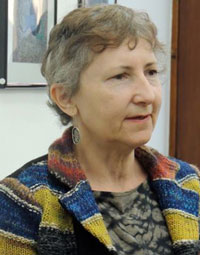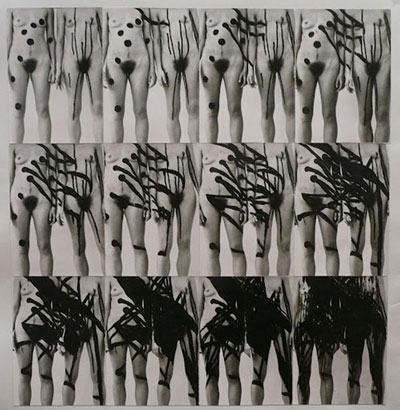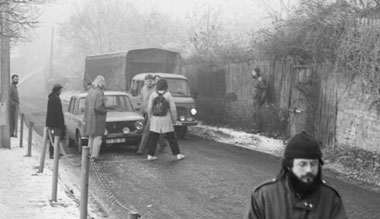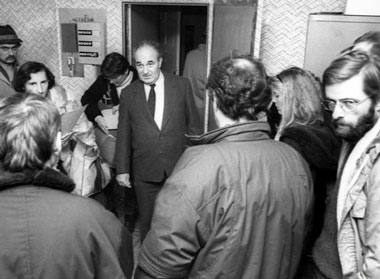Disobedient
dispatch 2
East Germany in the 80's
1, An interview with Gabriele Stötzer
(jump to interview)
(jump to images)
(click for dispatch 1: Italy in the 1970's)
A photo of Gabriele Stotzer and others in the underground Erfurt Gallery she ran,
taken
the Stassi (East German State Security). 1981
The numbers above each individual correlate with names indexed in Stassi files.
- Photo from the Tagesspeigel website.
Its one thing to talk about how it is that I came upon this interview (mundanely, I was looking for subjects for my ongoing research project funded with the help of Metabolic Studio) and another thing to read it.
In the GfZGK (Gallery for Contemporary Art) in Leipzig, I was looking at their current Encountering Performance exhibition that looks at performance art during the East German Period. The show smartly currated younger artists to reenact the work. So, spread throughout exhibit's four rooms are videos of several different DDR interventionist performances and their contemporary re-stagings. One telling comparison focuses on a performance where a man stands in public space asking for hugs from passers-by. The contemporary artist voices-over the work explaining just how mundane his work feels for urban space for the performance (a mall) and the contemporary context greatly lessen the affective impact of the original work within the DDR. He explains how much more fraught a piece the East German work was because of its entirely different relationship to normative and outsider behavior and also the use of public commercial space.
Gabriele Stotzer's video, in black and white, shows her in various locations, in various degrees of dress, dancing. On top of a building; shaking, on a streetside park; stepping. Each step, as much as anything else, seemed like a tentative wiggle shaking into full being. You can feel her wonder.
Given the opportunity to interview her, I did some background research. Gabriele Stötzer was jailed for being the first to sign a letter supporting Wolf Beirman, a popular East German folk singer who was kicked out of the DDR in 1976. After her jailing, she remained in the East and began working as an artist. She worked confidently as a feminist within a variety of collectives in and around her home town of Erfurt. As she describes in the interview, as she was considered an enemy of the working class, she was not allowed to officially show work as an artist but worked instead in an underground scene I am just begining to understand. She ran an independent gallery and mostly showed work by and to female audiences.
East Germany had an elaborate spy network, it has been said that every one in three people collaborated in one way or another with the state security aparatus, spying on peers. This network did not end in alternative and underground networks. Nevertheless, I am impressed to read that the solidarities within Gabriele's clique were so tight, they can boldly say that they never snitched.
She worked with a super-8 collective at one point called exterra XX.
There are stunning video's that I've seen of people storming the state security (stassi) offices in 1989. If I'm correct, there's a video of the Leipzig Stassi office being overrun by a group of dissidents, the passion and planning are perfectly displayed in a scene shot from the outside of the building. The door of the Stassi office is opened and people run from the edge of the frame through the doorway. One occupier takes a door jamb from his bag, places it at the bottom of the door and walks in.
These are memorable images and depict the collapse of the East German regime.
Gabriele was the member of a feminist collective, Frauen für Veränderung, who orchestrated the first Stassi occupation in her home city of Erfurt. Other members of the group included Tely Buchner, Sabine Fabian, Claudia Bogenhardt, Kestin SchonShe notes in a video, ZivilCourage by Diethard Klante that the group was effective because they were not a part of the normal resistance groups and their time-consuming politics. She also notes that the group was made up of three mothers, 1 pregnant woman and 1 former prisoner.
Below is the transcript I conducted with her at a cafe near the gallery. I spoke English, she German. I recorded the text which was latter translated (I paid in a local independent time-banking currency) by Michael Wübben.
The interview is interesting because it goes relatively deeply into what it is to be an artist in general, patriarchy, the psychological aspects of living in a survailance society with a high level of conscientious mediation aimed at producing particular subjects. It also evocatively suggests a role for imagination and the effects of real solidarity within our lives. I think it's insights are very valuable today.
>>>>>>>>>>>>>>>>>>>>>>>>>>>>>>
Marc Herbst (MH)
I am curious about how you are moving in the video's on display at the GfZGK. It appears as though you are moving around for the first time. You seem almost extatic. What are you thinking and feeling?
Gabriele Stötzer (GS)
In the beginning, using my body was some thing totally natural for me. So I used to get naked in order to be away from any fashion or period. My body always used to be an instrument allowing me to illustrate/represent anything I had to, or wanted. That's why in the beginning I often did a campaign where I stripped down and got naked, in order to see the individual as such. When you do that yourself, then there also a certain tension in seeing yourself as a secret and discovering yourself. It's feeling yourself, feeling who you really are.
Later, I transferred this "feeling yourself" to other people, who I worked with and who I stripped off.
This directness and toughness against myself and others is something I had definitely learned in jail. When you got into jail, the first thing they do is taking off your clothes and searching every hole for secret messages. Again and again, in the cell, you are watched by men through holes when showering or using the toilet.
I transferred the radicalness I had been treated with in jail to create an art concept. My thought was "The others see me, now I want to know how I really am, now I will look at myself.“ That's the feeling, the substance. So taking off my clothes was not a kind of resistance, but more like the search for myself. I wanted to get back what others had taken away from me, for sure, but I wanted to go further than the others, beyond limits.
I wanted to discover something essentially human inside myself.
(MH) I appreciated how you move in the videos. You're not only naked, you seem to be experiencing what it is to move, to be. You seem to be trying out your own body… how it feels to be.
(GS) First, I really love dancing. For me, dancing has always been a way of escaping reality, coming back to myself, and completely devoting myself to dancing. Then what I did was simply turning it into an art form: I told people to go to a certain place in Erfurt, the city we lived in, and dance themselves into a state of ecstasy.
In the DDR, there were few ways to reach ecstasy, the only thing available to alter your consciousness was alcohol, but alcohol actually destroyed your consciousness. What I wanted was expanding, raising consciousness, and that we realize who we really are. I've read somewhere that no matter what drugs are able do with you, you are able do it yourself without drugs, too. As long as you have a certain mindset, you can do that yourself.
That's why it's often worth encouraging people, because once you bring something into the world, it's there. Actually, we are wonderful creatures, you know. I always thought I had to develop my own trance, my own way of not thinking so small-minded, and go beyond the now.
There was more to my artwork than the DDR, or its politicians. When you become an artist, you are in search of a whole different level of being. Then you reach other levels of being, you discover that's what connects us. We all want to evolve/develop ourselves, and I've always had the wish to make a contribution. I've never been keen on egoism, even though we tried to be individualistic in order to exist. The DDR was a state that tried to exterminate people and drive them into self-devotion, but in other ways then Christian devotion, because in real devotion you had a relationship to God, and in socialism, you were isolated from the others, from above and from beneath, you just had to follow a fictive goal, which did not mean a higher development, but merely restraining yourself.
I did not want to restrain myself, I wanted to be young, I wanted to live, I wanted to get the maximum out of myself. After all, I wanted to hold a mirror up to those people who always restrained me when I was in jail. I wanted to show them: That's what you are doing to me.
That was the first performance.
I always represented myself to them, I confronted them with themselves, with the things they were doing to me. I was a victim. Being the "clawed hand of the enemy of the working class", I was kicked out of University, then I was put in jail. But I kept returning to the state again and again, and I told them: „This is what you are doing to me.“ Of course, this was horrible for my parents, who had expected their daughter, getting good grades and being "Beststudentin", to thrive, but in the end I ruined their dreams, so to say.
(MH) You said earlier that the image of The People in the DDR was an image of “the good woman in front of the good worker (always a macho)in front of the good state.” Can you tell me about that more? How did that image affect your work?
(GS) This image didn't work because it wasn't true, it didn't work on the social level.
I did not have to strive against it at all, because it just wasn't real, it didn't exist.
That's why we had this free space, we had to look inside ourselves, we were searching for ourselves. Neither mothers talked to their daughters, nor fathers to their sons. It was hard to grow up as a German. My father took part in World War II, and that was his youth. He could never talk about his childhood, because he was a criminal, a German soldier. There was this silence at home which survived into the next generations. Strangely enough, I never confronted my father and never asked him what wrong he had done. I never felt at home somehow, so I mainly was in search of home, and then I was in search of myself. That's what I tried to illustrate/show/represent with arts, I tried to illustrate the other Me.
I knew that there was more to it, this could not be true, this could not be all. The silence was not true. The guilt we Germans had was not true, but as a German I was guilty, even though I was not. So I wanted to escape the guilt, the silence, the doctrine from above. In the DDR there were few ways of expanding one's mind. Now in the Western world you have various possibilities of expanding body and mind, but back in the DDR we didn't have any. I knew that these other truths existed, and I knew that they only existed in terms of arts, so I became artist and writer, because that was the only frame allowing me to think in. If it doesn't exist in society, then you can't think of it, because you can't create everything on your own.
(MH) Before, you talked about an interest in Freud. You mentioned that when you were studying to become a teacher before you were imprisoned, something dramatic occured when you asked your teacher about the works of Freud?
(GS) I was really curious about Freud, because I expected him to show me a bit of the human truth inside me.
Not only was the image of the woman restricted in the DDR, it was also the vocabulary that thinkers like Freud may have provided.
I wanted words that help me to recognize myself. We were supposed to be guilty, to not exist, to restrain ourselves, so I wanted words that told me who I am, so could know that I was this and that.
In the first Psychology lesson I asked when it's time to talk about Freud, because the lecturer kept saying we had the Russians philosophers, bla bla bla...So I asked for Freud, and he said that Freud analyzed sub-conscience, but here we live in conscious state, that's why we only did these Pavlov's dog experiments...you see the light up there, it makes your mouth water, but it always stays up there, you never reach what you want. I was tired of that.
That's why I used constellations against the socialist image of women, constellations associated with earth, wind, fire and water, you know, like the fire inside me. I suddenly found the words! Psychology does have words for things like refusal or shame. We had a few words they were not enough for my life, they didn't help me recognize myself, forgive myself, give myself a chance. So the first time I tried to work in a conspiratorial way was using constellations. There was Aries, and very names like Aries or so, or the Chinese constellations like Snail or Dragon. Socialism only had laborers, farmers or soldiers, and these were all options.
Constellations are like folktales. In the Arab world, they use weapons as constellations, we use constellations that really are in the sky, and the Chinese have these, and the Native Americans have those, etc. That was so fascinating to me, because every new word came with a new attribute, and I felt so much wealthy. I needed all that for living. Young people are full of hope, they need so much, like "I want to live, and I want to live now". I also wanted to live, to live totally [? "voll leben"]. This was my struggle for survival.
(MH) Earlier I (Marc) asked you how you came to understand your oppression and what specifically your actions were against. You responded, “This is very important. My actions weren’t against anything, they were for living.”
I was struck by your bold move then to take over the Erfurt Stassi building. I’d read it was unplanned, is that true? How did that happen? It must have come from your group process. Tell me more, please.
(GS) Yes, that's true. Many people say, "there is a long dark way, and at the end there's a light", or something like that, but I had a dark way, and there was no light at the end. My strength is in resisting and holding out, without knowing exactly what I'm fighting against and why I'm doing this at all. And sometimes something happens, and then you have to be in the moment and accept that this is life, this is what you have to do. Of course, since we were politically thinking students, and especially with me being "claw of the hand of enemy of the working class", who demanded freedom of speech and thought, was thrown off the university, I got had to do forced labor, I had to do it.
They expelled Biermann and I thought, this can't be true, a nation without its singer. So we started a petition of support for him in Erfurt. I signed it first on the list, I was considered leader of a subversive group. The one brave enough to be the first to sign a white paper is the strongest, so I was put in jail for one year. Afterwards I was released into the DDR again, while all the others who had been put in jail for the Biermann case were released to West Germany. I thought then, „now that I've lost everything, I can become a writer.“
I grew up on the countryside, and my parents used to warn me, „Art doesn't pay the bills.“ Now I was free, I had lost everything, so I could become an artist. Being an artist in the underground, I could live it all out. And since I did it, other people also wanted to do it. They didn't want to work for socialist production, they wanted to be free.
Since I had been in jail, I could not enter this official writers' or artists' association, and I had to stay in the underground. And there were also all these machos who tried to use them as mattresses, reduce them to sexual objects.
I had been in jail, I knew what to do not to go to jail again, and I also knew that you should stay away from these men, but without these men (in the underground], the scene didn't exist, so I had to place myself next to them. But there couldn't be any hierarchy or love or so that was impossible. That's why the women came to me, because they wanted to be like me, ill-reputed, a little terrible, a little wicked, but also a bit free. That's what connected us, we did arts, and not that kind of gossip group. We really wanted to do arts, and that's what lifted us above this reality. That's how it happened...
In Erfurt I had this women's group, and other women's groups were founded following our model. It's a difference if there are only men's groups in a city, or if there are various women's groups. Suddenly the feminine had a lot of power, self-assertion and autonomy. And at the time of the reunification, there were a lot of men's groups, "Demokratischer Aufbruch"... and they needed women and said: Hey, why don't you join us? But we said, no, we have founded our own women's group, "Frauen für Veränderung" [Women for Change], where we educated ourselves in politics, and we held speeches on the big demonstrations.
And then there was the day when five women in Erfurt decided that the burnings of Stasi files must stop. There was a lot of smoke rising above the Stasi building, and we said, „they are burning their files, which is property of the people“, so we decided, today we are going to storm the Stasi. So one woman went to the big factories, on Monday morning. Every Monday morning in certain circles they used to decide about what to do this week. So this woman went in alone and told them, „we are going to occupy the Stasi, you are welcome to join us, think about that.“ They went on strike, and then we all surrounded the Stasi building. We, the women, went to the mayor and told him „the Stasi has to be stormed, we are going to file a charge against them because they are destroying national property.“ So we did not let them criminalize us, but we criminalized them.
And this was the first time the mayor called the Stasi and told them that the people want to enter the building, and he was on our side. Then we also talked to the Interior Secretary and to the Party. The strategy was basically talking to the bosses, so they distance themselves from the Stasi, and then talking to the Stasi. Then the Stasi was tired and let the people come in who in the meantime had gathered around the building. That's how it happened. It wasn't that simple. It wasn't about heading to the Stasi and running down the doors. It was about having these leaders on our side, and then criminalizing the Stasi. And it worked. We were the first to do this, and then the other cities followed.
And by defeating the Stasi, the whole state [system] was defeated. And this was a moment, like what Karl Marx called a historical moment by Karl Marx, was like when you do arts the first time, and it was art. It was another level. So the historical moment was there, and the only thing you could do was follow this way, because there was this power of the masses, the situation was open, everything was possible, and you felt that.
(MH) At this moment of taking over the Erfurt Stassi HQ, what was the art of that action?
(GS) Courage is the art. Art is daring to do or to be something special. And this was the moment. I suddenly understood that this was the moment, and it's only me who can do this, and I'm going to do this now. Not today or later or so, just taking the chance right now. This exhibitionism, this putting yourself in the center, something every artist is able to do, or has to bear, drawing all eyes on yourself, elevating yourself and, on a higher level, just being, just accepting. You know, on that day, we didn't ever doubt if it was right or wrong, it was just acting straightforward in this moment, being in this moment, without splitting up, just this being one, this was this moment, and understanding that we will never go back, that this is possible.
>>>>>>>>>>>>>>>>>>>>>>>>>>>>>>
Images gathered from 'round the web

a recent image of Gabriele Stotzer

Gabriele Stötzer, Schrei Carmen, 1982, 10 Schwarz-Weiß-Fotografien, jeweils 18 x 13 cm, Courtesy Gabriele Stötzer,
VG Bild-Kunst Bonn

Gabriele Stötzer, Verschmelzung (part of the installation: und, frauen miteinander), 1982-83, photo: Gabi Kachold and Heike Stephan

Image of Stotzer and others approaching the Stassi offices in Erfurt to begin the
occupation. 1989
-Film still grabbed from the movie Zivilcourage by Diethard Klante

Inside the Erfurt Stassi office, confronting a Stassi official.1989
-Film still grabbed from the movie Zivilcourage by Diethard Klante